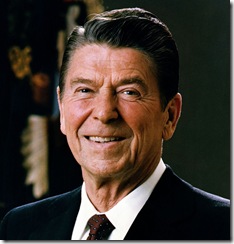 It’s hard to generalize about 78 million people, but boomers do share some distinctive traits.
It’s hard to generalize about 78 million people, but boomers do share some distinctive traits.
As Ronald Reagan again made the news on the days leading up to his centennial celebration, it was a surprise to learn just how much this icon of the Greatest Generation had in common with the boomer generation.
As a student of boomers, I was struck by the similarities and by the observation that Reagan illustrated some of the qualities that make up the largest generation in history.
As a generation, boomers refuse to accept things the way they are and will change them, presumably for the better. Throughout their lives boomers have participated in tremendous changes in our society.
Reagan challenged the status quo as a young boy: When a local inn would not allow black people to stay, he brought them back to his house where they spent the night. Later, as president, he signed the legislation for Martin Luther King Jr. Day.
Boomers have a strong work ethic. They transformed work in America.
As the largest, most educated generation flooded the workplace, competition was fierce during the down economy of the 1980s. Working longer and harder to stand out became the norm.
While Reagan had many speechwriters, he demonstrated an untiring drive to write. According to the book “Reagan, In His Own Hand,” while campaigning for president Reagan “wrote 670 essays, some 335,000 words, in just four years.”
Boomers paint the world as a glass half-full, eternally optimistic about the future.
That optimism has much to do with the prosperity of the ’50s and ’60s when boomers came of age.
While being rushed to the hospital after he was shot in 1981, Reagan used his sense of humor to crack jokes, demonstrating his hopeful, positive demeanor.
Today, on the other side of 50, many boomers are reinventing themselves to follow their passion and purpose into an encore career. Ronald Reagan was 55 when he reinvented himself and ran for governor of California.
Boomers dislike being defined by age. In 2005, Madonna, Oprah and Christy Brinkley, looking decades younger than their real ages, announced “50 is the new 30.” Ronald Reagan didn’t consider age a barrier; becoming, at age 69, the oldest person elected president.
In his life, Reagan experienced one of the most striking health challenges anticipated for boomers. The National Institute of Health calls Alzheimer’s the “defining disease of the baby boomers.”
Well before his own diagnosis, President Reagan helped to raise awareness for Alzheimer’s and dementia with the proclamation of National Alzheimer’s Disease Month in November 1983. In 1994, he shared with U.S. citizens the fact that he had Alzheimer’s. To date, Reagan is the most public figure to disclose an Alzheimer’s diagnosis.
In the last line of his 1964 speech “A Time for Choosing,” Reagan sums up a mind-set that aligns with the boomers’ archetype: “You and I have the ability and the dignity and the right to make our own decisions and determine our own destiny.”
Whatever your politics, the events of that era have most likely had an influence on us. Boomers were in their 20s and 30s during the Reagan presidency.
The Reagan Library gives boomers the opportunity to revisit some of the historic events that have occurred during their lifetimes.
Newly renovated, the Reagan Library is open 10 a.m. to 5 p.m. seven days a week.
More ...